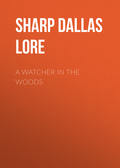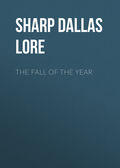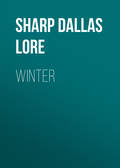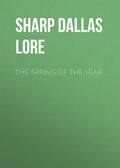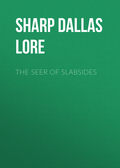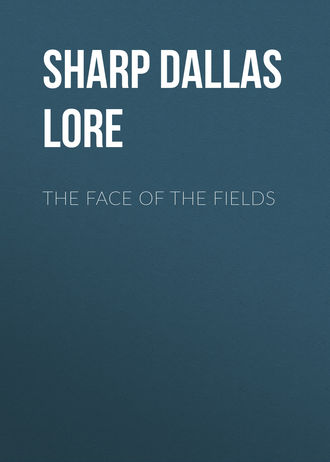
Sharp Dallas Lore
The Face of the Fields
VI
JOHN BURROUGHS
JOHN BURROUGHS began his literary career (and may he so end it!) by writing an essay for the “Atlantic Monthly,” as good an introduction (and conclusion), speaking by the rhetoric, as a lifelong composition need have. That first essay entitled “Expression,” “a somewhat Emersonian Expression,” says its author, was printed in the “Atlantic” for November, 1860, which was fifty years ago. Fifty years are not threescore and ten; many men have lived past threescore and ten, but not many men have written continuously for the “Atlantic” for fifty years with eye undimmed and natural force unabated. Mr. Burroughs’s eye for the truth of nature has grown clearer during these fifty years, and the vigor of his youth has steadied into a maturity of strength which in some of his latest essays – “The Long Road,” for instance – lifts one and bears one down the unmeasured reaches of geologic time, compassing the timelessness of time, its beginninglessness, its endinglessness, as none of his earlier chapters have done.
Many men have written more than Mr. Burroughs. His eighteen or twenty books, as books may be turned out, are nothing remarkable for fifty years of work. It is not their numbers, but the books, that are remarkable, that among them should be found “Wake-Robin,” “Winter Sunshine,” “Birds and Poets,” “Locusts and Wild Honey,” “Pepacton,” “Fresh Fields,” “Signs and Seasons,” “Riverby,” “Far and Near,” “Ways of Nature,” and “Leaf and Tendril”; for these eleven nature-books, as a group, stand alone and at the head of the long list of books written about the out-of-doors since the days of the Historia Animalium, and the mediæval “Fables” and “Beasteries.”
These eleven volumes are Mr. Burroughs’s characteristic, his important work. His other books are eminently worth while: there is reverent, honest thinking in his religious essays, a creedless but an absolute and joyous faith; there is simple and exquisite feeling in his poems; close analysis and an unmitigatedness, wholly Whitmanesque, in his interpretation of Whitman; and no saner, happier criticism anywhere than in his “Literary Values.” There are many other excellent critics, however, many poets and religious writers, many other excellent nature-writers, too; but is there any other who has written so much upon the ways of nature as they parallel and cross the ways of men, upon so great a variety of nature’s forms and expressions, and done it with such abiding love, with such truth and charm?
Yet such a comparison is beyond proof, except in the least of the literary values – mere quantity; and it may be with literature as with merchandise: the larger the cask the greater the tare. Charm? Is not charm that which I chance to like, or you chance to like? Others have written of nature with as much love and truth as has Mr. Burroughs, and each with his own peculiar charm: Audubon, with the spell of wild places and the thrill of fresh wonder; Traherne, with the ecstasy of the religious mystic; Gilbert White, with the sweetness of the evening and the morning; Thoreau, with the heat of noonday; Jefferies, with just a touch of twilight shadowing all his pages. We want them severally as they are; Mr. Burroughs as he is, neither wandering “lonely as a cloud” in search of poems, nor skulking in the sedges along the banks of the Guaso Nyero looking for lions. We want him at Slabsides, near his celery fields. And whatever the literary quality of our other nature-writers, no one of them has come any nearer than Mr. Burroughs to that difficult ideal, – a union of thought and form, no more to be separated than the heart and the bark of a live tree.
Take Mr. Burroughs’s work as a whole, and it is beyond dispute the most complete, the most revealing, of all our outdoor literature. His pages lie open like the surface of a pond, sensitive to every wind, or calm as the sky, holding the clouds and the distant blue, and the dragon-fly, stiff-winged and pinned to the golden knob of a spatter-dock.
All outdoor existence, all outdoor phenomena, are deeply interesting to him. There is scarcely a form of outdoor life, scarcely a piece of landscape, or natural occurrence characteristic of the Eastern States, which has not been dealt with suggestively in his pages: the rabbit under his porch, the paleozoic pebble along his path, the salt breeze borne inland by the Hudson, the whirl of a snowstorm, the work of the honeybees, the procession of the seasons over Slabsides, even the abundant soil out of which he and his grapes grow and which, “incorruptible and undefiled,” he calls divine.
He devotes an entire chapter to the bluebird, a chapter to the fox, one to the apple, another to the wild strawberry. The individual, the particular thing, is always of particular interest to him. But so is its habitat, the whole of its environment. He sees the gem, not cut and set in a ring, but rough in the mine, where it glitters on the hand of nature, and glitters all the more that it is worn in the dark. Naturally Mr. Burroughs has written much about the birds; yet he is not an ornithologist. His theme has not been this or that, but nature in its totality, as it is held within the circle of his horizon, as it surrounds, supports, and quickens him.
That nature does support and quicken the spiritual of him, no less than the physical, is the inspiration of his writing and the final comment it requires. Whether the universe was shaped from chaos with man as its end, is a question of real concern to Mr. Burroughs, but of less concern to him than the problem of shaping himself to the universe, of living as long as he can upon a world so perfectly adapted to life, if only one be physically and spiritually adaptable. To take the earth as one finds it, to plant one’s self in it, to plant one’s roof-tree in it, to till it, to understand it and the laws which govern it, and the Perfection which created it, and to love it all, – this is the heart of Mr. Burroughs’s religion, the pith of his philosophy, the conclusion of his books.
But if a perfect place for the fit, how hard a place is this world for the lazy, the ignorant, the stubborn, the weak, the physically and spiritually ill! So hard that a torpid liver is almost a mortal handicap, the stars in their courses fighting against the bilious to defeat them, to drive them to take exercise, to a copious drinking of water, to a knowledge of burdock and calomel – to obedience and understanding.
Underlying all of Mr. Burroughs’s thought and feeling, framing every one of his books, is a deep sense of the perfection of nature, the sharing of which is physical life, the understanding of which is spiritual life, is knowledge of God himself, in some part of His perfection. “I cannot tell what the simple apparition of the earth and sky mean to me; I think that at rare intervals one sees that they have an immense spiritual meaning, altogether unspeakable, and that they are the great helps, after all.” How the world was made – its geology, its biology – is the great question, for its answer is poetry and religion and life itself. Mr. Burroughs is serenely sure as to who made the world; the theological speculation as to why it was made, he answers by growing small fruits on it, living upon it, writing about it.
Temperamentally Mr. Burroughs is an optimist, as vocationally he is a writer, and avocationally a vine-dresser. He plants and expects to gather – grapes from his grape-vines, books from his book-vines, years, satisfactions, sorrows, joys, all that is due him.
The waters know their own and draw
The brook that springs in yonder heights;
So flows the good with equal law
Unto the soul of pure delights.
And what is it that is due him? Everything; everything essential; as everything essential is due the pine tree, the prairie, the very planet. Is not this earth a star? Are not the prairie, the pine tree, and man the dust of stars? each a part of the other? all parts of one whole – a universe, round, rolling, without beginning, without end, without flaw, without lack, a universe self-sustained, perfect?
I stay my haste, I make delays,
For what avails this eager pace?
I stand amid the eternal ways,
And what is mine shall know my face.
Mr. Burroughs came naturally by such a view of nature and its consequent optimism. It is due partly to his having been born and brought up on a farm where he had what was due him from the start. Such birth and bringing-up is the natural right of every boy. To know and to do the primitive, the elemental; to go barefoot, to drive the cows, to fish, and to go to school with not too many books but with “plenty of real things” – these are nominated in every boy’s bond.
Serene, I fold my hands and wait,
is the poem of a childhood on the farm, and the poem of a manhood on the farm, in spite of the critic who says: —
“We have never ceased to wonder that this friend of the birds, this kindly interpreter of nature in all her moods, was born and brought up on a farm; it was in that smiling country watered by the east branch of the Delaware. No man, as a rule, knows less about the colors, songs, and habits of birds, and is more indifferent to natural scenery than the man born to the soil, who delves in it and breathes its odors. Contact with it and laborious days seem to deaden his faculties of observation and deprive him of all sympathy with nature.” During the days when the deadening might have occurred, Mr. Burroughs was teaching school. Then he became a United States bank examiner, and only after that returned to the country where he still lives. He is now in his seventies, and coming full of years, and fuller and fuller of books, as his vines are full of years, and fuller and fuller of grapes.
Could it be otherwise? If men and grapes are of the same divine dust, should they not grow according to the same divine laws? Here in the vineyard along the Hudson, Mr. Burroughs planted himself in planting his vines, and every trellis that he set has become his own support and stay. The very clearing of the land for his vineyard was a preparation of himself physically and morally for a more fruitful life.
“Before the snow was off in March,” he says in “Literary Values,” “we set to work under-draining the moist and springy places. My health and spirits improved daily. I seemed to be under-draining my own life and carrying off the stagnant water, as well as that of the land.” And so he was. There are other means of doing it – taking drugs, playing golf, walking the streets; but surely the advantages and the poetry are all in favor of the vineyard. And how much fitter a place the vineyard to mellow and ripen life, than a city roof of tarry pebbles and tin!
Though necessarily personal and subjective, Mr. Burroughs’s writing is entirely free from self-exploitation and confession. There are pages scattered here and there dealing briefly and frankly with his own natural history, but our thanks are due to Mr. Burroughs that he never made a business of watching himself. Once he was inveigled by a magazine editor into doing “An Egotistical Chapter,” wherein we find him as a boy of sixteen reading essays, and capable at that age of feeding for a whole year upon Dr. Johnson! Then we find him reading Whipple’s essays, and the early outdoor papers of Higginson; and later, at twenty-three, settling down with Emerson’s essays, and getting one of his own into the “Atlantic Monthly.”
How early his own began to come to him!
That first essay in the “Atlantic” was followed by a number of outdoor sketches in the New York “Leader” – written, Mr. Burroughs says, “mainly to break the spell of Emerson’s influence and get upon ground of my own.” He succeeded in both purposes; and a large and exceedingly fertile piece of ground it proved to be, too, this which he got upon! Already the young writer had chosen his field and his crop. The out-of-doors has been largely his literary material, as the essay has been largely his literary form, ever since. He has done other things – volumes of literary studies and criticisms; but his theme from first to last has been the Great Book of Nature, a page of which, here and there, he has tried to read to us.
Mr. Burroughs’s work, in outdoor literature, is a distinct species, with new and well-marked characteristics. He is the nature-writer, to be distinguished from the naturalist in Gilbert White, the mystic in Traherne, the philosopher in Emerson, the preacher, poet, egotist in Thoreau, the humorist in Charles Dudley Warner. As we now know the nature-writer we come upon him for the first time in Mr. Burroughs. Such credit might have gone to Thomas Wentworth Higginson, had he not been something else before he was a lover of nature – of letters first, then of flowers, carrying his library into the fields; whereas Mr. Burroughs brings the fields into the library. The essay whose matter is nature, whose moral is human, whose manner is strictly literary, belongs to Mr. Burroughs. His work is distinguished by this threefold and even emphasis. In almost every other of our early outdoor writers either the naturalist or the moralist or the stylist holds the pen.
Early or late, this or that, good outdoor writing must be marked, first, by fidelity to fact; and, secondly, by sincerity of expression. Like qualities mark all good literature; but they are themselves the very literature of nature. When we take up a nature-book we ask (and it was Mr. Burroughs who taught us to ask), “Is the record true? Is the writing honest?”
In these eleven volumes by Mr. Burroughs there are many observations, and it is more than likely that some of them may be wrong, but it is not possible that any of them could be mixed with observations that Mr. Burroughs knows he never made. If Mr. Burroughs has written a line of sham natural history, which line is it? In a preface to “Wake-Robin,” the author says his readers have sometimes complained that they do not see the things which he sees in the woods; but I doubt if there ever was a reader who suspected Mr. Burroughs of not seeing the things.
His reply to these complaints is significant, being in no manner a defense, but an exquisite explanation, instead, of the difference between the nature which anybody may see in the woods and the nature that every individual writer, because he is a writer, and an individual, must put into his book: a difference like that between the sweet-water gathered by the bee from the flowers and the drop of acid-stung honey deposited by the bee in the comb. The sweet-water undergoes a chemical change in being brought to the hive, as the wild nature undergoes a literary change – by the addition of the writer’s self to the nature, while with the sweet-water it is by the addition of the bee.
One must be able to walk to an editorial office and back, and all the way walk humbly with his theme, as Mr. Burroughs ever does – not entirely forgetful of himself, nor of me (because he has invited me along); but I must be quiet and not disturb the fishing – if we go by way of a trout-stream.
True to the facts, Mr. Burroughs is a great deal more than scientific, for he loves the things – the birds, hills, seasons – as well as the truths about them; and true to himself, he is not by any means a simple countryman who has never seen the city, a natural idyl, who lisps in “Atlantic” essays, because the essays come. He is fully aware of the thing he wants to do, and by his own confession has a due amount of trouble shaping his raw material into finished literary form. He is quite in another class from the authors of “The Complete Angler” and “New England’s Rarities Discovered.” In Isaak Walton, to quote Leslie Stephen, “a happy combination of circumstances has provided us with a true country idyl, fresh and racy from the soil, not consciously constructed by the most skillful artistic hand.”
Now the skillful artistic hand is everywhere seen in Mr. Burroughs. What writer in these days could expect happy combinations of circumstances in sufficient numbers for eleven volumes? Albeit a stone house, in a vineyard by the Hudson, seems a very happy combination, indeed!
But being an idyl, when you come to think of it, is not the result of a happy combination of circumstances, but rather of stars – of horoscope. You are born an idyl or you are not, and where and when you live has nothing to do with it.
Who would look for a true country idyl to-day in the city of Philadelphia? Yet one came out of there yesterday, and lies here open before me, on the table. It is a slender volume, called “With the Birds, An Affectionate Study,” by Caroline Eliza Hyde. The author is discussing the general subject of nomenclature and animal distribution, and says: —
“When the Deluge covered the then known face of the earth, the birds were drowned with every other living thing, except those that Noah, commanded by God, took two by two into the Ark.
“When I reflect deeply and earnestly about the Ark, as every one should, thoughts crowd my mind with an irresistible force.”
[And they crowd my mind, too.]
“Noah and his family had preserved the names of the birds given them by Adam. This is assured, for Noah sent a raven and a dove out to see if the waters had abated, and we have birds of that name now. Nothing was known of our part of the globe, so these birds must have remained in the Holy Land for centuries. We do not hear of them until America was discovered…
“Bats come from Sur. They are very black mouse-like birds, and disagreeable… The bobolink is not mentioned in the Bible, but it is doubtless a primitive bird. The cock that crows too early in the morning … can hardly be classed with the song-birds. The name of the hummingbird is not mentioned in the Bible, but as there is nothing new under the sun, he is probably a primitive bird.”
Mr. Burroughs will agree that the hummingbird is probably a primitive bird; and also that this is a true idyl, and that he could not write a true idyl if he tried. No one could write like that by trying. And what has any happy combination of circumstances to do with it? No, a book essentially is only a personality in type, and he who would not be frustrated of his hope to write a true idyl must himself be born a true idyl. A fine Miltonic saying!
Mr. Burroughs is not an idyl, but an essayist, with a love for books only second to his love for nature; a watcher in the woods, a tiller of the soil, a reader, critic, thinker, poet, whose chief business these fifty years has been the interpretation of the out-of-doors.
Upon him as interpreter and observer, his recent books, “Ways of Nature” and “Leaf and Tendril,” are an interesting comment.
Truth does not always make good literature, not when it is stranger than fiction, as it often is, and the writer who sticks to the truth of nature must sometimes do it at the cost of purely literary ends. Have I sacrificed truth to literature? asks Mr. Burroughs of his books. Have I seen in nature the things that are there, or the strange man-things, the “winged creeping things which have four feet,” and which were an abomination to the ancient Hebrews, but which the readers of modern nature-writing do greedily devour – are these the things I have seen? And for an answer he sets about a reëxamination of all he has written, from “Wake-Robin” to “Far and Near,” hoping “that the result of the discussion or threshing will not be to make the reader love the animals less, but rather to love the truth more.”
But the result, as embodied in “Ways of Nature” and in “Leaf and Tendril,” is quite the opposite, I fear; for these two volumes are more scientific in tone than any of his other work; and it is the mission, not of science, but of literature, to quicken our love for animals, even for truth. Science only adds to the truth. Yet here, in spite of himself, Mr. Burroughs is more the writer, more the interpreter, than the investigator. He is constantly forgetting his scientific thesis, as, for instance, in the account of his neighbor’s errant cow. He succeeds finally, however, in reducing her fairly well to a mechanical piece of beef acting to vegetable stimuli upon a nerve ganglion located somewhere in the region between her horns and her tail.
Now, all this is valuable, and the use made of it is laudable, but would we not rather have the account than the cow, especially from Mr. Burroughs? Certainly, because to us it is the account that he has come to stand for. And so, if we do not love his scientific animals more, and his scientific findings more, we shall, I think, love all his other books more; for we see now that, from the beginning, he has regarded the facts of nature as the solid substance of his books, to be kept as free from fancy and from false report, as his interpretation of them is to be kept free from all exaggeration and cant.
Here, then, are eleven volumes of honest seeing, honest feeling, honest reporting. Such honesty of itself may not make good nature-literature, but without such honesty there can be no good nature-literature.
Nature-literature is not less than the truth, but more; how much more, Mr. Burroughs himself suggests to us in a passage about his literary habits.
“For my part,” he says, “I can never interview nature in the reporter fashion. I must camp and tramp with her to get any good, and what I get I absorb through my emotions rather than consciously gather through my intellect… An experience must lie in my mind a certain time before I can put it upon paper – say from three to six months. If there is anything in it, it will ripen and mellow by that time. I rarely take any notes, and I have a very poor memory, but rely upon the affinity of my mind for a certain order of truths or observations. What is mine will stick to me, and what is not will drop off. We who write about nature pick out, I suspect, only the rare moments when we have had glimpses of her, and make much of them. Our lives are dull, our minds crusted over with rubbish like those of other people. Then writing about nature, or about most other subjects, is an expansive process; we are under the law of evolution; we grow the germ into the tree; a little original observation goes a good way.” For “when you go to nature, bring us good science or else good literature, and not a mere inventory of what you have seen. One demonstrates, the other interprets.”
Careful as Mr. Burroughs has been with his facts, so careful as often to bring us excellent science, he yet has left us no inventory of the out-of-doors. His work is literature; he is not a demonstrator, but an interpreter, an expositor who is true to the text and true to the whole of the context.
Our pleasure in Mr. Burroughs as an interpreter comes as much from his wholesome good sense, from his balance and sanity, I think, as from the assurance of his sincerity. Free from pose and cant and deception, he is free also from bias and strain. There is something ordinary, normal, reasonable, companionable, about him; an even tenor to all his ways, a deliberateness, naturalness to all his paths, as if they might have been made originally by the cows. So they were.
If Mr. Burroughs were to start from my door for a tramp over these small Hingham hills he would cross the trout-brook by my neighbor’s stone bridge, and nibbling a spear of peppermint on the way, would follow the lane and the cow-paths across the pasture. Thoreau would pick out the deepest hole in the brook and try to swim across; he would leap the stone walls of the lane, cut a bee-line through the pasture, and drop, for his first look at the landscape, to the bottom of the pit in the seam-face granite quarry. Here he would pull out his note-book and a gnarly wild apple from his pocket, and intensely, critically, chemically, devouring said apple, make note in the book that the apples of Eden were flat, the apples of Sodom bitter, but this wild, tough, wretched, impossible apple of the Hingham hills united all ambrosial essences in its striking odor of squash-bugs.
Mr. Burroughs takes us along with him. Thoreau comes upon us in the woods – jumps out at us from behind some bush, with a “Scat!” Burroughs brings us home in time for tea; Thoreau leaves us tangled up in the briars.
It won’t hurt us to be jumped at now and then and told to “scat!” It won’t hurt us to be digged by the briars. It is good for us, otherwise we might forget that we are beneath our clothes. It is good for us and highly diverting, but highly irritating too.
For my part, when I take up an outdoor book I am glad if there is quiet in it, and fragrance, and something of the saneness and sweetness of the sky. Not that I always want sweet skies. It is ninety-eight degrees in the shade, and three weeks since there fell a drop of rain. I could sing like a robin for a sizzling, crackling thunder-shower – less for the sizzling and crackling than for the shower. Thoreau is a succession of showers – “tempests”; his pages are sheet-lightning, electrifying, purifying, illuminating, but not altogether conducive to peace. There is a clear sky to most of Mr. Burroughs’s pages, a rural landscape, wide, gently rolling, with cattle standing here and there beneath the trees.
Mr. Burroughs’s natural history is entirely natural, his philosophy entirely reasonable, his religion and ethics very much of the kind we wish our minister and our neighbor might possess; and his manner of writing is so unaffected that we feel we could write in such a manner ourselves. Only we cannot.
Since the time he can be said to have “led” a life, Mr. Burroughs has led a literary life; that is to say, nothing has been allowed to interfere with his writing; yet the writing has not been allowed to interfere with a quiet successful business, – with his raising of grapes.
He has a study and a vineyard.
Not many men ought to live by the pen alone. A steady diet of inspiration and words is hard on the literary health. The writing should be varied with some good wholesome work, actual hard work for the hands; not so much work, perhaps, as one would find in an eighteen-acre vineyard; yet Mr. Burroughs’s eighteen acres have certainly proved no check – rather, indeed, a stimulus – to his writing. He seems to have gathered a volume out of every acre; and he seems to have put a good acre into every volume. “Fresh Fields” is the name of one of the volumes, “Leaf and Tendril” of another; but the freshness of his fields, the leaves and the tendrils of his vineyard, enter into them all. The grapes of the vineyard are in them also.
Here is a growth of books out of the soil, books that have been trimmed, trained, sprayed, and kept free from rot. Such books may not be altogether according to the public taste; they will keep, however, until the public acquires a better taste. Sound, ripe, fresh, early and late, a full crop! Has the vineyard anything to do with it?
It is not every farmer who should go to writing, nor every writer who should go to farming; but there is a mighty waste of academic literature, of premature, precocious, lily-handed literature, of chicken-licken literature, because the writers do not know a spade when they see one, would not call it a spade if they knew. Those writers need to do less writing and more farming, more real work with their soft hands in partnership with the elemental forces of nature, or in comradeship with average elemental men – the only species extant of the quality to make writing worth while.
Mr. Burroughs has had this labor, this partnership, this comradeship. His writing is seasoned and sane. It is ripe, and yet as fresh as green corn with the dew in the silk. You have eaten corn on the cob just from the stalk and steamed in its own husk? Green corn that is corn, that has all its milk and sugar and flavor, is corn on the cob, and in the husk, – is cob and kernel and husk, – not a stripped ear that is cooked into the kitchen air.
Literature is too often stripped of its human husk, and cut from its human cob: the man gone, the writer left; the substance gone, the style left – corn that tastes as much like corn as it tastes like puffed rice, – which tastes like nothing at all. There is the sweetness of the husk, the flavor of the cob, the substance of the uncut corn to Mr. Burroughs.
There is no lack of cob and husk to Thoreau, of shell and hull, one should say, for he is more like a green walnut than an ear of green corn. Thoreau is very human, a whole man; but he is almost as much a tree, and a mountain, and a pond, and a spell of weather, and a state of morals. He is the author of “Walden,” and nobody else in the world is that; he is a lover of nature, as ardent a lover as ever eloped with her; he is a lover of men, too, loving them with an intensity that hates them bag and baggage; he is poetical, prophetic, paradoxical, and utterly impossible.
But he knew it. Born in Concord, under the transcendental stars, at a time when Delphic sayings and philosophy, romance and poetry ran wild in the gardens where Bouncing-Bet and Wayward Charlie now run wild, Thoreau knew that he was touched, and that all his neighbors were touched, and sought asylum at Walden. But Walden was not distant enough. If Mr. Burroughs in Roxbury, New York, found it necessary to take to the woods in order to escape from Emerson, then Thoreau should have gone to Chicago, or to Xamiltapec.
It is the strain, in Thoreau, that wearies us; his sweating among the stumps and woodchucks, for a bean crop netting him eight dollars, seventy-one and one half cents. But such beans! Beans with minds and souls! Yet, for baking, plain beans are better than these transcendental beans, because your transcendental beans are always baked without pork. A family man, however, cannot contemplate that piddling patch with any patience, even though he have a taste for literature as real as his taste for beans. It is better to watch Mr. Burroughs pruning his grape-vines for a crop to net him one thousand, three hundred and twenty-five dollars, and no cents, and no half-cents. Here are eighteen acres to be cultivated, whose fruit is to be picked, shipped, and sold in the New York markets at a profit – a profit plainly felt in Mr. Burroughs’s books.



